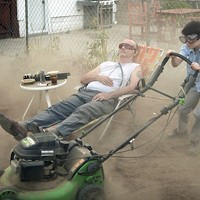LOST IN TRANSLATION
****
DIRECTED BY Sofia Coppola
STARS Bill Murray, Scarlett Johannson

-
Scarlett Johannson and Bill Murray. (Photo: Focus Features)
It used to be that the mere mention of the name "Sofia Coppola" would draw up dire memories of her wretched performance in The Godfather Part III, or her awful screenplay for her dad's portion of the Coppola-Woody Allen-Martin Scorsese concoction New York Stories.
No more.
I missed Coppola's feature film debut as writer-director, the fairly well-received The Virgin Suicides, but I imagine even that movie wouldn't have prepared me for the countless pleasures of Lost In Translation. Funny, philosophical, good-natured, heartbreaking, subdued, energetic, inspiring -- it's everything you wouldn't expect from a 32-year-old filmmaker still getting her feet wet in her chosen profession.
Then again, being the daughter of Francis Ford Coppola probably didn't hurt. Coppola pere is known for such epic undertakings as The Godfather and Apocalypse Now, yet he's no stranger to more intimate tales, as anyone who's seen his remarkable '70s effort The Conversation can attest. Nepotism has run wild over the Hollywood hills as far as this man is concerned -- nephew Nicolas Cage is but one name associated with Six Degrees of Francis Coppola -- yet in the case of Sofia, it looks like she's a keeper.
Bill Murray, in what may be the finest performance of his career, plays Bob Harris, an American movie star in Tokyo. Is Bob in town to shoot a film? To take part in an international press junket? To catch some much needed r&r? None of the above. Bob's actually in town to collect a $2 million paycheck for appearing in a Japanese commercial pushing a brand of whiskey. We're constantly reading about how big-name stars like Brad Pitt and Harrison Ford earn millions for appearing in foreign commercials that they know will never reach our shores, yet here's the first major movie savvy enough to employ that tidbit in its storyline. Just perfect.
Initially, Bob appears to be suffering from jet lag, but it soon becomes apparent that his malaise isn't temporary -- on the contrary, Bob's in a perpetual gloomy funk, mostly for unspecified reasons. Yet glimmers of explanation pop through: Mid-life crisis; a 25-year marriage that might have grown comfortable but might also have grown stale; a sense of the preferred life not being lived (at one point, Bob notes that he could be doing a great play for scale rather than a TV commercial for millions). Situated at a luxurious Tokyo hotel, Bob, who suffers from insomnia, roams the corridors like one of the walking dead, usually ending up in the establishment's bar.
In another room of the hotel, we find Charlotte (Scarlett Johansson), who's only in Tokyo as an appendage to her husband John (Giovanni Ribisi), a rising photographer in town to shoot a few celebrity spreads. Charlotte is young, intelligent, beautiful, and, as we can tell in her eyes, a bit mystified that she's married. John's constantly leaving his wife for hours and even days at a stretch to head off on some assignment, giving Charlotte plenty of down time to reflect on the nature of things. Like Bob, she's an insomniac, meaning that she also finds herself in the hotel bar after-hours.
It's while sucking down drinks that Bob and Charlotte initially make each other's acquaintance -- no big deal, just two American strangers in a strange land, united by that fact that they're, well, American. But Bob and Charlotte soon find themselves drawn to each other time and again, for reasons far beyond their shared nationality. A pair of "old souls" heading in different directions in life -- yet both faced with many of the same introspective concerns -- the pair end up becoming good friends, occasionally leaving the confines of the hotel to experience the swirling Tokyo nightlife. The question of whether they'll end up in bed together is never as pressing as the question of whether their brief encounter will enable them to grow as human beings.
Sofia Coppola (who's been to Tokyo numerous times) has stated that the movie is in many ways a valentine to this sprawling metropolis, yet don't think this is one of those films in which a foreign land is viewed as a center for spiritual nourishment, with eye-popping images of majestic natural surroundings. As presented here, Tokyo is a wonderland of gaudy sights and garish sounds -- perhaps as close to a literal translation of the lyrics to "Lucy In the Sky With Diamonds" as a physical entity can get. It's like New York City after getting zapped with the Lucky Charms leprechaun's rainbow-hued wand, a colorful city that's having too much fun to even dream of sleeping. It's the perfect setting for this particular story about two people momentarily disoriented by the world around them.
Lost In Translation is a specialized movie for a specialized audience. It's one of those unique, introverted gems, like The Accidental Tourist or The Piano or Krzysztof Kieslowski's "Three Colors" trilogy, that either enfolds you with its generosity of spirit or leaves you cold, scratching your head and wondering, "Is that all there is?" And moviegoers who complain about the artificiality of far too many American movies are especially encouraged to check this one out. As is usually the case in the real world, this picture shows that there are no happy endings and there are no sad endings, and, sometimes, there are no endings at all. Furthermore, all of the characters' problems aren't instantly solved, and everything isn't wrapped up with a nice little bow.
Many people will call Lost In Translation a slice of life. I call it a slice of heaven.

